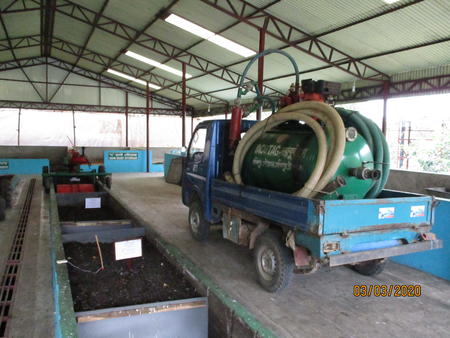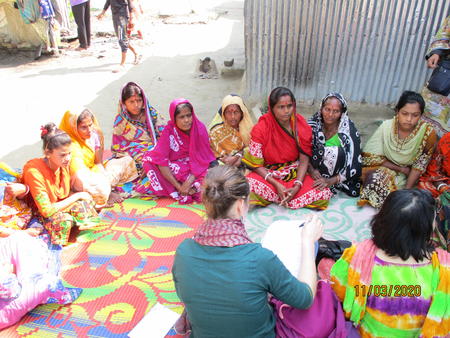Are minorities losing out on improved sanitation work? Calls to action for Bangladesh

Drawing on a study undertaken with WaterAid in February–March 2020, Sally Cawood, Malisha Farzana, Faisal Naeem and Hossain I. Adib reflect on the challenges facing manual pit latrine emptiers, and key actions to foster improved job opportunities for marginalised sanitation workers in Bangladesh.
Focusing on the health, safety and dignity of all sanitation and waste workers is vital to realising the human right to decent work and safe sanitation for all. This is particularly important to those working in manual emptying – the removal of human faeces from pit latrines, septic tanks, sewers and drains by hand or with basic tools. Despite increasing global attention on the plight of sanitation workers, especially during the COVID-19 pandemic, this study and previous research show that, in Bangladesh and elsewhere across South Asia, religious and ethnic minorities involved in hazardous manual emptying work are not always able to benefit from improvements (such as mechanisation) in urban sanitation, or access alternative livelihood options.
In Bangladesh, self-defined Harijan (low-caste Hindu) and marginalised Muslim communities continue to work in precarious conditions, and even fear job loss in the shift from manual to mechanical pit emptying. Why is this, and what can be done to support these workers, their families and communities?
Our study sheds some light on these important questions. We found that this opportunity gap, especially for Harijan emptiers, is connected to not only ongoing discrimination linked to identity, occupation and place of residence, but also nepotism and bribery, with some reporting having to pay local recruiters to access municipal cleaning work, including on the mechanical trucks as a driver or helper: "You didn’t have to pay to get a job before" – male emptier, Saidpur. Irregular work patterns and informal subcontracting, a practice also documented in India, were further concerns, as a male emptier in Thakurgaon reported:
The work is going to other communities. And on top of that they are subcontracting the dirty jobs to us with a fraction of the money they are receiving.
The reduction of manual work – although hazardous and degrading – has had knock-on effects for income and expenditure, with some workers arguing that "saving the environment [via mechanical trucks] has become the cause of our stomachs being dead," – male emptier, Saidpur. While training and skill development provided by local governments and non-governmental organisations (NGOs) has improved occupational health and safety, and sought to transition manual emptiers into improved (mechanical, rather than manual) work, these initiatives are often carried out at a small scale within a few municipalities. In the absence of assurances of long-term employment opportunities for most pit emptiers, many simply return to manual emptying under the radar, or travel into rural areas in search of work.
Are alternative livelihoods a viable option?
Our study found some encouraging cases in which former manual emptiers had entered alternative livelihoods, including small-scale business (such as auto-rickshaw driving), law enforcement or administrative roles. Young men and women in Harijan communities are also increasingly well-educated and seeking different livelihoods to their parents and grandparents.
NGOs such as HEKS-EPER, Gram Bikash Kendra and Eco-Social Development Organization have played a key role in helping workers find alternatives, providing education, technical, vocational training and career support. Despite this progress, the lack of prospective job opportunities means young men and women are still dropping out of school to support their families through paid or unpaid employment. For young boys, this can mean shadowing male family members as they go ‘into the pits’, starting as young as seven years old.
Age is not important here. But poverty is. Poverty made us work in the pits.
– male emptier, Saidpur.
A highly competitive job market also means that young men from Harijan and, increasingly, Muslim communities are entering the occupation anew, to earn extra income.
While we found that women and girls also help their families in pit-emptying work (for example, carrying buckets – a poorly documented and often unpaid practice), or clean private latrines in neighbouring homes, most female study participants were employed as road sweepers or solid waste collectors at the local municipalities, or homemakers.
Skill development programmes, including doormat or paper bag making; tailoring; chicken or goat fattening; and savings initiatives have sought to expand employment opportunities. However, female and male participants highlighted the harassment they have faced when attempting to work outside occupations prescribed by caste stigma. Many young people also reported being ridiculed because of their language or place of residence – mixed dialects (distinct from Bangla) are predominantly spoken at home in Harijan communities, and many live in segregated colonies (a legacy of British colonialism) often with insecure land and housing tenure. As one Harijan community leader in Thakurgaon remarked in an interview:
The person who got a master’s degree is working as a sweeper. He applied for a computer operator position…but when they saw the address as the sweeper colony he was rejected.
Similar incidents were also reported in Dhaka. Lack of start-up capital, the internalisation of social stigma and the need to earn now (rather than spend time attending training) were further barriers to workers entering alternative employment.
Actions to improve work opportunities for minorities within and outside sanitation
Our study highlighted several opportunities and action points by which local and national government, NGOs and activists can support manual emptiers, their families and communities now, during the COVID-19 pandemic, and in future.
- Promote strategic alliances between WASH, labour, dalit or minority rights organisations to enforce labour laws to protect workers and collectively lobby for the Anti-Discrimination Act in Bangladesh to provide legal protection against discrimination (a key priority for workers from Harijan communities).
Linked to this, promote education and training of young people, especially, to help them break out of highly stigmatised occupations and into alternative or improved livelihood options. - Promote an inclusive approach to faecal sludge management (FSM) to ensure marginalised communities are not left behind in sanitation interventions, including collective lobbying for a rise in FSM and solid waste budgets to enable permanent job creation; incorporation of long-term (rather than one-off) training to integrate workers into new and existing FSM programmes; or transition plans for alternative livelihoods (outside sanitation work). Further, lobby the Government for social security, housing and employment schemes for sanitation workers. Multi-organisational platforms like the Bangladesh FSM Network can play an instrumental role in this.
- Support grassroots leadership and collectivisation, to ensure manual emptiers are able to put their demands at the forefront of advocacy, policy and planning in FSM. This could involve training male and female leaders (especially young people), and collective organisation of workers via associations, cooperatives or sanitation worker unions. As shown elsewhere in Bangladesh (PDF), cooperatives can be registered (by government authorities) as formal institutions to provide cleaning services to municipalities, city corporations and low-income communities through service-level agreements. At the same time, organised workers and support organisations can use these platforms to create links with financial institutions such as banks, microfinance institutions, insurance agencies and other commercial or trade associations, to enhance sustainability. Apex bodies like the Municipal Association of Bangladesh should have a leadership role in extending such networks and links.
- Finally, as shown by the COVID-19 pandemic, strong advocacy initiatives with the Government to ensure safety and security of sanitation workers – especially marginalised pit emptiers – during and post-pandemic are essential. Being frontline agents for protecting environmental health, they should be prioritised for COVID-19 support, including vaccinations. This will again require multiple national and international agencies to work together to achieve lasting change.
These actions form part of an ongoing agenda to fight for decent work in urban sanitation. To learn more, explore The health, safety and dignity of sanitation workers. Sally Cawood is a Global Challenges Fellow at the University of Sheffield, UK. This blog forms part of Sally’s project on sanitation work in India and Bangladesh. Malisha Farzana and Faisal Naeem, graduates of Dhaka University, Bangladesh, were research assistants in this project. Hossain I. Adib is Director of Programmes at WaterAid Bangladesh.
Top image: Sajib returning from a manual pit emptying job with bucket, spade and bicycle (pseudonym used to protect anonymity).





